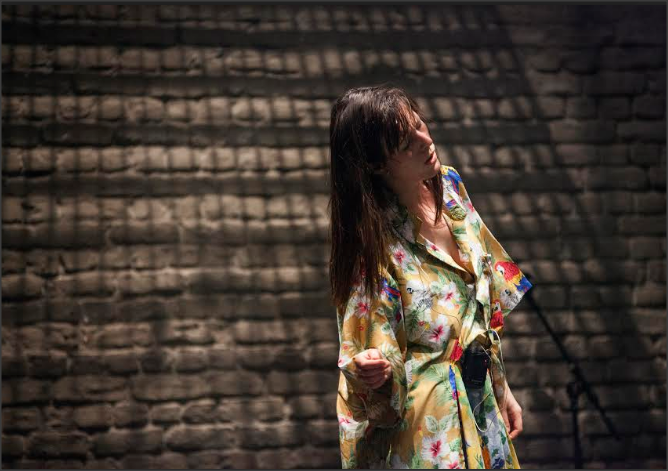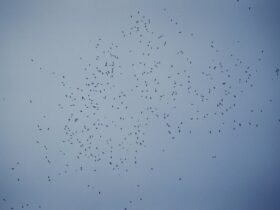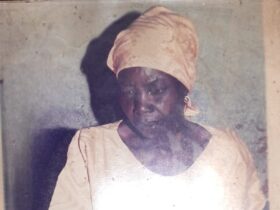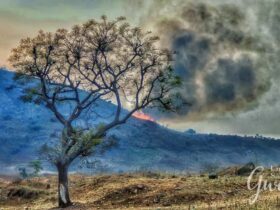
Andrea Grieder is a poet and social anthropologist. She is the founder and director of Transpoesis, an organization based in Rwanda with the aim to empower through Poetry. Originally from Switzerland, she has a Ph.D. from the University of Zurich and Ecole des Hautes Etudes en Sciences Sociales (EHESS), Paris. She is a lecturer at the University of Technology and Arts of Byumba (UTAB), Rwanda.
Absolute Darkness envelops us when we sleep. We may see it as color on paper and feel its magnetic heaviness. In the performance, Celestial Sorrow, we are confronted with absolute darkness in the theater hall (www.gessnerallee.ch ).
The performance was created by Meg Stuart in collaboration with visual artist, Jompet Kuswidananto, who grew up under the dictatorship of President Suharto in Indonesia. From a fictive trauma, the artists explore how the ghosts of the past inhabit or possess us. Three artists and two musicians create a poetic universe of light and movements.

During the first part, when hundreds of bulbs give a celestial light, I turn my head back and check the green emergency sign. A few minutes later, I check again. It is turned off. I think: absolutely professional. Then, I sit in absolute darkness. For a second, we see a flickering light in the audience: a smartphone? Then again, darkness. I close my eyes so the darkness feels more natural and to chase a feeling of panic in the corner of my eyes.
I remember a dark night under the sky in east Africa. In a tent on an island, I felt too small to breathe. A moment of panic. What if there is a power cut and the lights go off, the whole island in darkness? Holding my phone close to me in the sleeping bag, checking the battery of my phone more than once, to be sure that it could help as a small lamp. With my thoughts back in the theatre hall, I realize that the ghosts of the past are never far, always around us in shades of light and darkness.
I still sit in absolute darkness. A voice. A soulful voice which becomes a place of shelter, a resort: A voice to heal the wounds of darkness and to chase the ghosts. The three artists speak out images of the past, sitting on the floor when light slowly guides us out of the darkness, their voices put the memories in place.
More ghosts of memories and trauma are on stage. One of the artists cries for help, does not wanna die in Zurich, but in New York: “I always wanted to meet with Marina (in reference to the performance artists Marina Abramovic, living in New York).” In her colorful dress, red high heels left behind, she lies flat on the on the stage floor, stretching her arm up, asking for help. “Help me!” She is addressing a man in the audience with a bold heart, he is sitting next to his wife.
For those who don’t know about the life of Marina: Her father wants her to learn to swim, sails with her in a small boat to the middle of a lake, throws her out of the boat and leaves her behind. The girl learns to survive instead of drowning; she also learns the cruelty of a father. That there is no help when she is asking for. In Celestial Sorrow, the woman artist begs for help from a second man, the one wearing a yellow pullover, then from a third. A shy smile. No other reaction.

I feel the pain of the passivity: a comfortable and internalized, consuming audience perspective, although the performance has introduced a fluidity between stage and audience in the first part of the piece by bringing three people from the audience onstage for a guided walk. We hear the voice again and again: “Help me, please!” One man finally gets up from this chair, and makes that movement of a hand, ready to help! It is too late. The artist turns away on the ground: “Man always come too late,” she says, giving voice to her deception, grieving.
Click hereThe hand that Marina Abramovic needed when she was (almost) drowning in the lake, that hand that the victims of cruelty in Indonesia would have needed facing the tortures of a dictatorship, came too late. In that universe of absolute darkness, there was no stage director to turn on the light, not even the green emergency exit signs.
- The Mother of the Ocean – #Andrea - May 25, 2023
- Poetic Insights – #Andrea - October 5, 2022
- Lightful: A Poetry Performance– #Andrea - May 13, 2022













Lovely